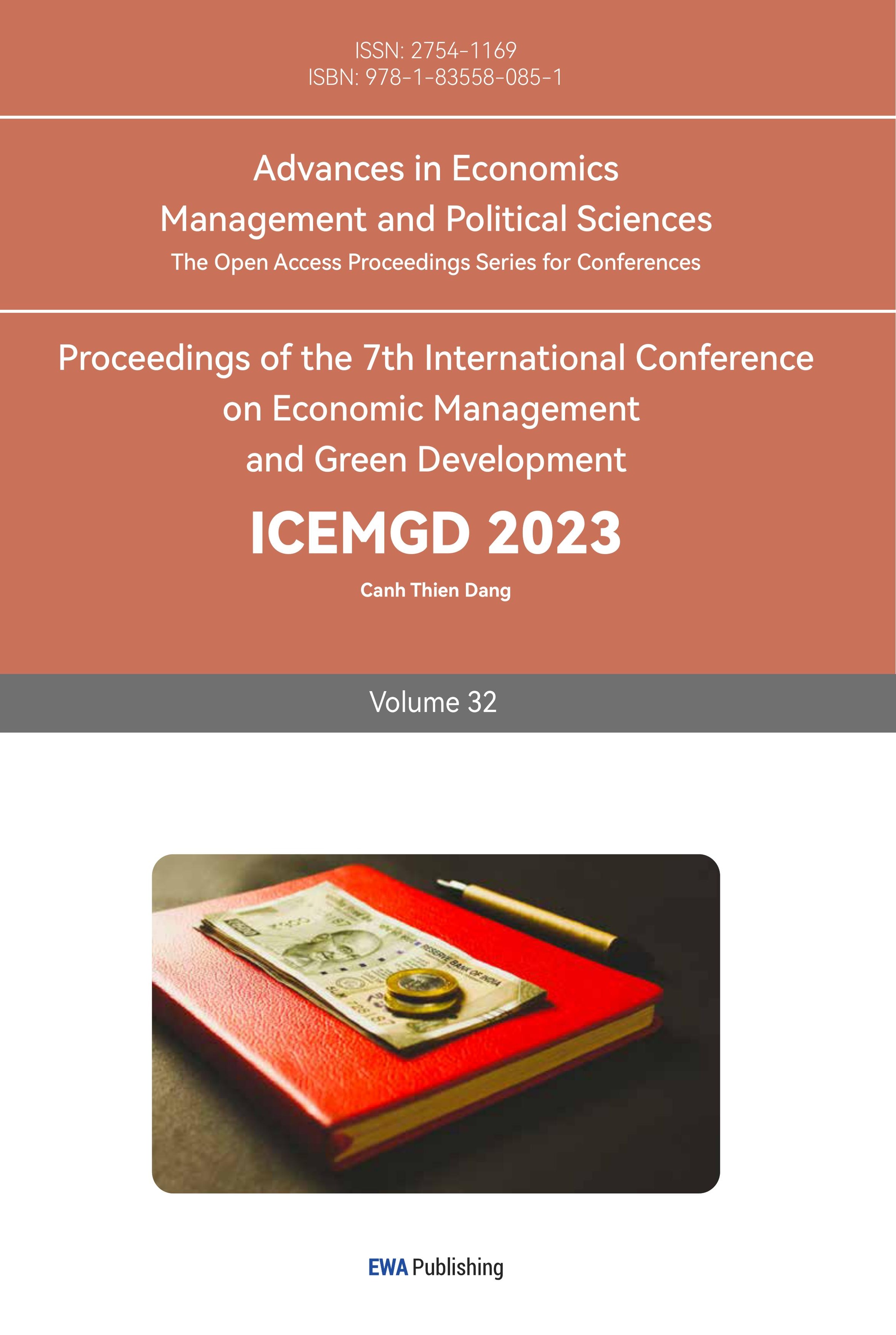References
[1]. Chen, L., Liu, X.: The US-China trade war and its impact on Huawei's global strategy. International Journal of Business and Economics, 18(2), 139-154 (2019).
[2]. Johnson, R., Wu, M.: Cybersecurity concerns and Huawei: Navigating a changing global market. Information Systems Security, 29(1), 22-35 (2020).
[3]. Zhang, Y., Wang, J., Zhao, X.: Huawei's self-reliance strategies in the face of geopolitical challenges. Journal of Technology Management in China, 16(3), 203-220(2021).
[4]. Smith, T., Patel, R.: Huawei's expansion into alternative markets: A comparative analysis of Africa, Latin Ameri-ca, and Southeast Asia. Emerging Markets Review, 46(1), 88-102 (2022).
[5]. Liu, C., Chen, W.: Huawei's investment in research and development. Journal of Business Strategy, 40(2), 23-29 (2019).
[6]. Wang, X., Zhang, Y.: Vertical integration strategy in the telecommunications industry: A case study of Huawei. International Business Review, 29(4), 101657 (2020).
[7]. Ghauri, P., Cateora, P.: International marketing (4th ed.). New York, NY: McGraw-Hill Education (2014).
[8]. Yip, G. S., McKern, B.: China's next strategic advantage: From imitation to innovation. Cambridge, MA: MIT Press (2016).
[9]. Sun, Y., Liu, F.: Understanding Huawei's business strategy in the global smartphone market. Journal of Chinese Management, 3(1), 1-20 (2016).
[10]. Luo, Y., Bu, J.: Huawei's globalization and corporate diplomacy: An emerging-market multinational's journey to global recognition. Journal of International Business Policy, 3(3), 286-311 (2020).
[11]. Baldwin, R., Evenett, S. J.: Value chains, industrial networks, and the new globalization: Huawei in America. In Revitalising Multilateralism: Pragmatic Ideas for the New WTO Director General (pp. 87-95). Centre for Economic Policy Research (2018).
Cite this article
Cai,Y. (2023). Huawei's Operational Strategy in the Changing International Landscape. Advances in Economics, Management and Political Sciences,32,225-231.
Data availability
The datasets used and/or analyzed during the current study will be available from the authors upon reasonable request.
Disclaimer/Publisher's Note
The statements, opinions and data contained in all publications are solely those of the individual author(s) and contributor(s) and not of EWA Publishing and/or the editor(s). EWA Publishing and/or the editor(s) disclaim responsibility for any injury to people or property resulting from any ideas, methods, instructions or products referred to in the content.
About volume
Volume title: Proceedings of the 7th International Conference on Economic Management and Green Development
© 2024 by the author(s). Licensee EWA Publishing, Oxford, UK. This article is an open access article distributed under the terms and
conditions of the Creative Commons Attribution (CC BY) license. Authors who
publish this series agree to the following terms:
1. Authors retain copyright and grant the series right of first publication with the work simultaneously licensed under a Creative Commons
Attribution License that allows others to share the work with an acknowledgment of the work's authorship and initial publication in this
series.
2. Authors are able to enter into separate, additional contractual arrangements for the non-exclusive distribution of the series's published
version of the work (e.g., post it to an institutional repository or publish it in a book), with an acknowledgment of its initial
publication in this series.
3. Authors are permitted and encouraged to post their work online (e.g., in institutional repositories or on their website) prior to and
during the submission process, as it can lead to productive exchanges, as well as earlier and greater citation of published work (See
Open access policy for details).
References
[1]. Chen, L., Liu, X.: The US-China trade war and its impact on Huawei's global strategy. International Journal of Business and Economics, 18(2), 139-154 (2019).
[2]. Johnson, R., Wu, M.: Cybersecurity concerns and Huawei: Navigating a changing global market. Information Systems Security, 29(1), 22-35 (2020).
[3]. Zhang, Y., Wang, J., Zhao, X.: Huawei's self-reliance strategies in the face of geopolitical challenges. Journal of Technology Management in China, 16(3), 203-220(2021).
[4]. Smith, T., Patel, R.: Huawei's expansion into alternative markets: A comparative analysis of Africa, Latin Ameri-ca, and Southeast Asia. Emerging Markets Review, 46(1), 88-102 (2022).
[5]. Liu, C., Chen, W.: Huawei's investment in research and development. Journal of Business Strategy, 40(2), 23-29 (2019).
[6]. Wang, X., Zhang, Y.: Vertical integration strategy in the telecommunications industry: A case study of Huawei. International Business Review, 29(4), 101657 (2020).
[7]. Ghauri, P., Cateora, P.: International marketing (4th ed.). New York, NY: McGraw-Hill Education (2014).
[8]. Yip, G. S., McKern, B.: China's next strategic advantage: From imitation to innovation. Cambridge, MA: MIT Press (2016).
[9]. Sun, Y., Liu, F.: Understanding Huawei's business strategy in the global smartphone market. Journal of Chinese Management, 3(1), 1-20 (2016).
[10]. Luo, Y., Bu, J.: Huawei's globalization and corporate diplomacy: An emerging-market multinational's journey to global recognition. Journal of International Business Policy, 3(3), 286-311 (2020).
[11]. Baldwin, R., Evenett, S. J.: Value chains, industrial networks, and the new globalization: Huawei in America. In Revitalising Multilateralism: Pragmatic Ideas for the New WTO Director General (pp. 87-95). Centre for Economic Policy Research (2018).









